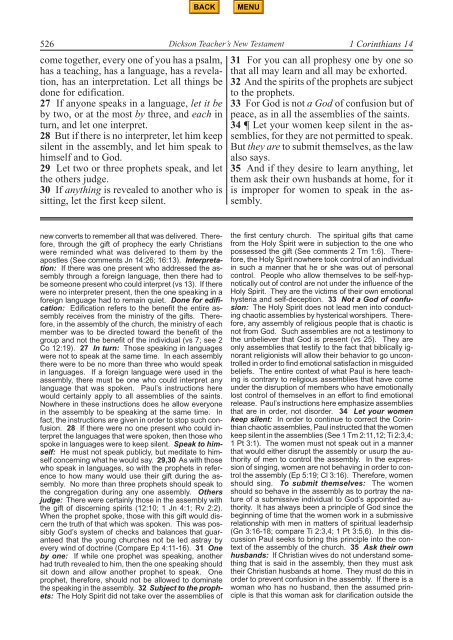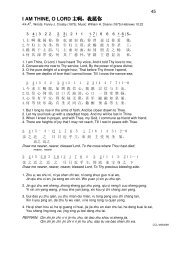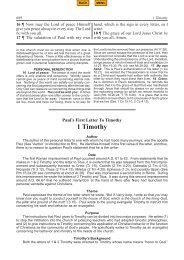1 Corinthians
1 Corinthians
1 Corinthians
You also want an ePaper? Increase the reach of your titles
YUMPU automatically turns print PDFs into web optimized ePapers that Google loves.
526 Dickson Teacher’s New Testament<br />
come together, every one of you has a psalm,<br />
has a teaching, has a language, has a revelation,<br />
has an interpretation. Let all things be<br />
done for edification.<br />
27 If anyone speaks in a language, let it be<br />
by two, or at the most by three, and each in<br />
turn, and let one interpret.<br />
28 But if there is no interpreter, let him keep<br />
silent in the assembly, and let him speak to<br />
himself and to God.<br />
29 Let two or three prophets speak, and let<br />
the others judge.<br />
30 If anything is revealed to another who is<br />
sitting, let the first keep silent.<br />
1 <strong>Corinthians</strong> 14<br />
31 For you can all prophesy one by one so<br />
that all may learn and all may be exhorted.<br />
32 And the spirits of the prophets are subject<br />
to the prophets.<br />
33 For God is not a God of confusion but of<br />
peace, as in all the assemblies of the saints.<br />
34 Let your women keep silent in the assemblies,<br />
for they are not permitted to speak.<br />
But they are to submit themselves, as the law<br />
also says.<br />
35 And if they desire to learn anything, let<br />
them ask their own husbands at home, for it<br />
is improper for women to speak in the assembly.<br />
new converts to remember all that was delivered. Therefore,<br />
through the gift of prophecy the early Christians<br />
were reminded what was delivered to them by the<br />
apostles (See comments Jn 14:26; 16:13). Interpretation:<br />
If there was one present who addressed the assembly<br />
through a foreign language, then there had to<br />
be someone present who could interpret (vs 13). If there<br />
were no interpreter present, then the one speaking in a<br />
foreign language had to remain quiet. Done for edification:<br />
Edification refers to the benefit the entire assembly<br />
receives from the ministry of the gifts. Therefore,<br />
in the assembly of the church, the ministry of each<br />
member was to be directed toward the benefit of the<br />
group and not the benefit of the individual (vs 7; see 2<br />
Co 12:19). 27 In turn: Those speaking in languages<br />
were not to speak at the same time. In each assembly<br />
there were to be no more than three who would speak<br />
in languages. If a foreign language were used in the<br />
assembly, there must be one who could interpret any<br />
language that was spoken. Paul’s instructions here<br />
would certainly apply to all assemblies of the saints.<br />
Nowhere in these instructions does he allow everyone<br />
in the assembly to be speaking at the same time. In<br />
fact, the instructions are given in order to stop such confusion.<br />
28 If there were no one present who could interpret<br />
the languages that were spoken, then those who<br />
spoke in languages were to keep silent. Speak to himself:<br />
He must not speak publicly, but meditate to himself<br />
concerning what he would say. 29,30 As with those<br />
who speak in languages, so with the prophets in reference<br />
to how many would use their gift during the assembly.<br />
No more than three prophets should speak to<br />
the congregation during any one assembly. Others<br />
judge: There were certainly those in the assembly with<br />
the gift of discerning spirits (12:10; 1 Jn 4:1; Rv 2:2).<br />
When the prophet spoke, those with this gift would discern<br />
the truth of that which was spoken. This was possibly<br />
God’s system of checks and balances that guaranteed<br />
that the young churches not be led astray by<br />
every wind of doctrine (Compare Ep 4:11-16). 31 One<br />
by one: If while one prophet was speaking, another<br />
had truth revealed to him, then the one speaking should<br />
sit down and allow another prophet to speak. One<br />
prophet, therefore, should not be allowed to dominate<br />
the speaking in the assembly. 32 Subject to the prophets:<br />
The Holy Spirit did not take over the assemblies of<br />
the first century church. The spiritual gifts that came<br />
from the Holy Spirit were in subjection to the one who<br />
possessed the gift (See comments 2 Tm 1:6). Therefore,<br />
the Holy Spirit nowhere took control of an individual<br />
in such a manner that he or she was out of personal<br />
control. People who allow themselves to be self-hypnotically<br />
out of control are not under the influence of the<br />
Holy Spirit. They are the victims of their own emotional<br />
hysteria and self-deception. 33 Not a God of confusion:<br />
The Holy Spirit does not lead men into conducting<br />
chaotic assemblies by hysterical worshipers. Therefore,<br />
any assembly of religious people that is chaotic is<br />
not from God. Such assemblies are not a testimony to<br />
the unbeliever that God is present (vs 25). They are<br />
only assemblies that testify to the fact that biblically ignorant<br />
religionists will allow their behavior to go uncontrolled<br />
in order to find emotional satisfaction in misguided<br />
beliefs. The entire context of what Paul is here teaching<br />
is contrary to religious assemblies that have come<br />
under the disruption of members who have emotionally<br />
lost control of themselves in an effort to find emotional<br />
release. Paul’s instructions here emphasize assemblies<br />
that are in order, not disorder. 34 Let your women<br />
keep silent: In order to continue to correct the Corinthian<br />
chaotic assemblies, Paul instructed that the women<br />
keep silent in the assemblies (See 1 Tm 2:11,12; Ti 2:3,4;<br />
1 Pt 3:1). The women must not speak out in a manner<br />
that would either disrupt the assembly or usurp the authority<br />
of men to control the assembly. In the expression<br />
of singing, women are not behaving in order to control<br />
the assembly (Ep 5:19; Cl 3:16). Therefore, women<br />
should sing. To submit themselves: The women<br />
should so behave in the assembly as to portray the nature<br />
of a submissive individual to God’s appointed authority.<br />
It has always been a principle of God since the<br />
beginning of time that the women work in a submissive<br />
relationship with men in matters of spiritual leaderhsip<br />
(Gn 3:16-18; compare Ti 2:3,4; 1 Pt 3:5,6). In this discussion<br />
Paul seeks to bring this principle into the context<br />
of the assembly of the church. 35 Ask their own<br />
husbands: If Christian wives do not understand something<br />
that is said in the assembly, then they must ask<br />
their Christian husbands at home. They must do this in<br />
order to prevent confusion in the assembly. If there is a<br />
woman who has no husband, then the assumed principle<br />
is that this woman ask for clarification outside the









